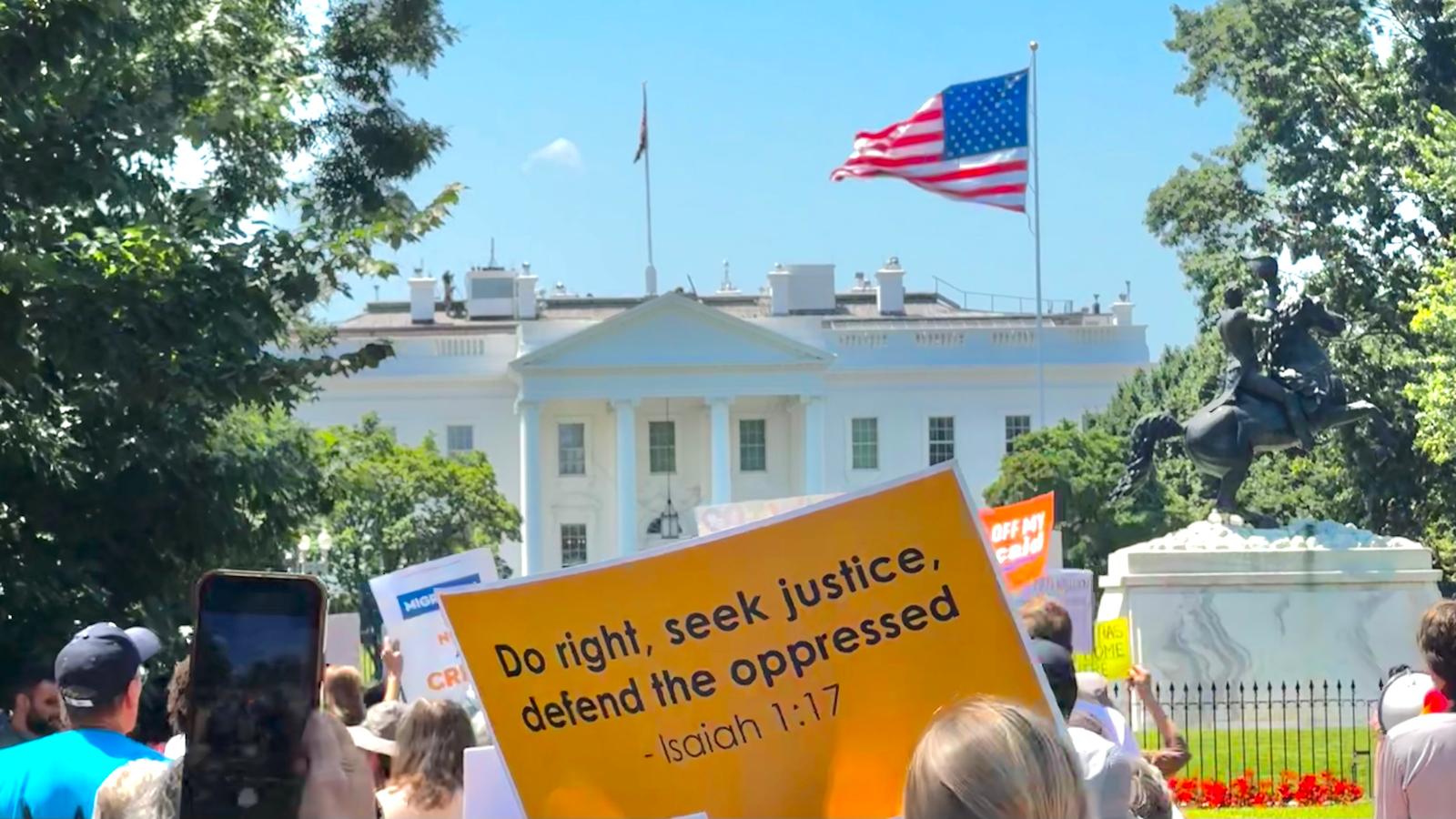Photo of demonstration for World Refugee Day, June 20, 2025, outside the White House by Thomas Gould.
Trump Administration Targets Legal Immigrants
The executive branch is waging legal warfare against the legal designations that protect people from deportation back to the dangerous countries they have fled. Immigration Advocacy Intern Rehema Klueg reports.
The U.S. executive branch is waging legal warfare against the immigration designations that protect people from deportation back to the dangerous countries they have fled. Immigration Advocacy Intern Rehema Klueg reports.
With the passage of the “One Big Beautiful Bill” Act, the Trump administration now has $170
billion in funding for border militarization and immigration enforcement, an amount greater than what Russia spent on its military budget while waging its invasion of Ukraine in 2024. The Trump administration has separately been working to revoke the legal statuses of immigrants lawfully in the United States.
A first step of the Trump administration’s attack on legal status was a revocation of humanitarian Parole for Cubans, Haitian, Nicaraguans, and Venezuelans (CHNV). In January of 2023, then-president Biden exercised his prerogative as president to grant people from these
nations the permission to enter and temporarily reside in the United States on account of the urgent humanitarian concerns and political instability in their home countries. Humanitarian Parole is not automatic and requires an application with character evidence.
On his first day of his second term in office, President Trump issued an executive order titled “Securing Our Borders,” which, among other things, directed his Secretary of Homeland Security to end the CHNV Humanitarian Parole program. New applications for the CHNV Parole Program were paused the following month.
On March 25, two months into the new Trump administration, the Department of Homeland Security (DHS) took a step further, announcing an early end to the CHNV Humanitarian Parole for immigrants currently living in the United States. Instead of a two-year parole expiration, parolees would have a maximum of thirty days left in the U.S. affecting roughly 532,000 people.
The Supreme Court in May overturned a lower court injunction that would have prevented a premature end to humanitarian parole protections. As of now, Humanitarian Parolees who applied and were granted a two-year parole no longer have work authorization and
are subject to deportation.
A separate effort to end the legal status of migrants has been an attack on Temporary Protected Status (TPS). TPS is a humanitarian protection program offered at the discretion of the DHS to allow people from designated countries experiencing extraordinary conditions to live and work in the United States for less than two years upon an application and criminal background check. Unlike Humanitarian Parole, it does not require a financial sponsor.
Currently, there are seventeen countries designated with TPS, including Afghanistan, Ukraine, Syria, and Yemen. TPS designations expire within two years unless renewed. While the president has the legal right to allow any TPS to expire, his efforts have hinged on ending TPS
prematurely and battling the existing deadlines in court. On February 1, ten days into the new Trump administration, DHS Secretary Kristi Noem announced an end of TPS for roughly 350,000 Venezuelans subjecting them to an exit date of April 7. On May 19, an 8-1 Supreme
Court temporarily allowed the administration to move forward with this action.
The Trump administration announced an end to TPS for Haiti on June 27 for more than 500,000 Haitians in the United States. A federal court in New York overturned the premature deadline imposed by DHS and restored a February 3, 2026, deadline four days later.
Most recently to the publication of this article, the Trump administration announced the cancellation of TPS for Nicaragua and Honduras on July 7 affecting roughly 4,000 Nicaraguans and 72,000 Hondurans.
These developments are particularly concerning in the face of escalating crises faced by these countries. For the past several years, Cuba is grappling with the biggest economic crisis since independence. Similarly, Nicaragua is witnessing the ramifications of an authoritarian
regime that has removed term limits, imprisoned political opponents, and used lethal force against protestors. In Venezuela, food scarcity and a lack of job opportunities have forced roughly 7.7 million people into exile since 2014. The Venezuelan government’s use of military
tribunals, suppression of the free press, and extrajudicial killings have been on the rise since the Maduro regime stole the presidential election in 2024. Sixty percent of Haiti’s capital city is under the control of gangs, and a UN report warns that gang violence worsened the first quarter of 2025, with a rise in murders, rapes, and kidnappings and with criminal groups
expanding their reach beyond the capital city.
Faith in action
Write to your members of Congress in defense of humanitarian protections for migrants. https://bit.ly/TellCongressDefendMigrants

